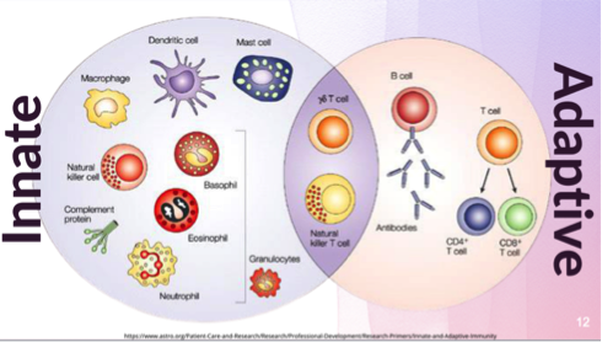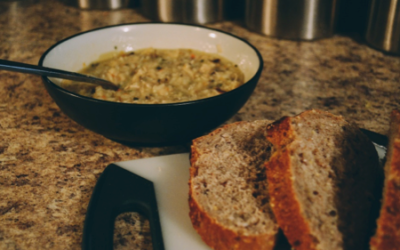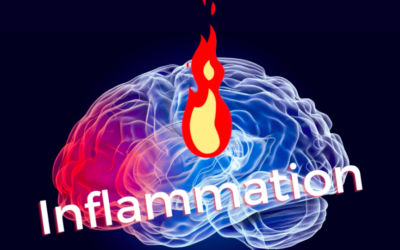During these trying time, at least here in the US, we are only hearing about medical treatments against Covid-19, including the importance of vaccination and how not to pass it around (i.e., masking and social distancing), however, nowhere are we hearing about what we can do to boost our immune system in the first place. This is the most important piece of the puzzle, especially since the immune-compromised are the ones most at risk.
So first, just a little about our immune system. We have two parts of our immune system, the innate and adaptive immune systems. The innate system is what we are born with and it has an important role in controlling infections during the first 7 days after an infection. It is more of a generic response to pathogens and our first line of defense. Many of the cells in the innate immune system, such as dendritic cells, macrophages, mast cells, neurtrophils, basophils and eosinophils, produce cytokines or interact with other cells directly in order to activate the adaptive immune system. Most of these are phagocytes which identify and exterminate foreign particles, and the natural killer cells are involved with cancer.
The adaptive immune system comes to us either from our mom in the womb or from antigens like cold or vaccines, and are our second line of defense. It has to do with allergens and with life-long immunity. T cells receive messages from the phagocytes, eliminate enemies and inform B cells to produce antibodies and stores in memory to allow for more rapid and effective response to re-infection
In the innate system, macrophages detect bacteria and envelop it and break it down. These dendritic cells are messengers between innate and adaptive systems. On the adaptive side, the B-cells make Y shaped proteins called antibodies, which are specific to each pathogen. They lock on the surface of an invading cell and mark it for destruction by other immune cells (like putting a flag on it).
Inflammation is mediated by the immune cells as an immediate defense in response to some sort of negative stimulus. When inflammation happens, chemicals from your body’s white blood cells enter your blood or tissues to protect your body from invaders. This raises the blood flow to the area of injury or infection and can cause redness and warmth and some of the chemicals cause fluid to leak into your tissues resulting in swelling. This protective process may trigger nerves and cause pain. Chronic inflammation is the root of chronic disease and disorders, including cognitive disorders. Autoimmunity can also be an end result and make one more susceptible to getting sick with things like COVID.
There are a lot of inflammatory triggers. Infections (virus, bacteria, parasite, yeast, etc.), chemicals and toxins, EMF, foods that we are sensitive to, etc. Gut health, which is increasing compromised on our modern society, plays a huge role in immune strength as immunity is born in the gut.
So what is the inflammatory process? Well, we need it, that is what signals the body to repair itself, but like a bathtub, we don’t want to leave the faucet on all the time. We need a gas and a brake. When there is an inflammatory challenge of some kind, such as oxidation, Omega 6 (Arachidonic Acid) starts the inflammation process and Omega 3 (EPA & DHA) stops it by making proctectins and resolvins.
So, it is critical that we have a proper ratio of Omega 6:3, because if we don’t have enough 3, we cannot stop the inflammatory process and eventually leading to a cytokine storm. Also, if you have a high 6:3 ratio, the cell releases particles called cell dust, or exosomes, which causes the release of the enzymes called matrix inteliproteases – extremly destructive enzymes, which destroy the Extra cellular matrix, collagen, cartilige, bone, arterial walls, and connective tissue, which is what holds your cells together. On another note, Polyphenols inhibit those enzymes (the matrix inteleproteases) and keep them under control, which is why a Mediterannean diet is really good for you.
So, a diet of highly depleted polyphenols, like a typical US or western diet, and a combination of an imbalance of omega 6:3 are dissolving your matrix and are what is preventing this inflammation process to extinguish.
In order to deal with chronic inflammation, we need to remove the triggers and support our bodies with the right nutrients and lifestyle habits.
In today’s world, there are lots of things that are contributing to our chronic inflammation. Inflammation may start while we are young but we could be in our 40’s by the time it expresses itself as a symptom. We need to concentrate on removing ourselves from the toxic exposures of our environment and in what we eat. Many things we cannot control, so we need to be extra vigilant about the things we can, such as pesticides in the foods we eat, our sleep hygiene, smoking, cleaning and self-care products. There are toxins in virtually everything, so we need to attend to every ingredient we come into contact with to see if there is a healthier alternative, such as using baking soda and vinegar to clean our house rather than chemicals. Other things that contribute to inflammation are: added sugars, excessive alcohol, lack of exercise, dehydration, and increased stress.
In order to reduce the inflammation, it is important to make sure that you have a ratio of Omega 6 to Omega 3 of 3:1 or better. Omega 6 is most plentiful in seed oils, so cooking with coconut oil and butter is best (note, there are some healthy versions of Omega 6, such as evening primrose and borage seed oils that we are not referring to). It is important to eat a diet rich in organic whole plant foods. We also need a diet rich in polyphenols, beta-glucans 1-3 & 1-6, and vitamin D.
Other nutrients that greatly increase the effectiveness of the immune system is Vitamin C (minimum 1,000mg/day), Zinc, vitamin A, elderberry, Echinacea, and garlic. Nutrients that are often found low in those with a weak immune system are: zinc, magnesium, selenium, iron, copper, folic acid, vitamin A, B6, C, D3, K2 & E. Since our modern soils are often lacking in essential nutrients, supplementation is often necessary. Be sure to try to get natural sources, since synthetic sources can potentially cause harm.
Other herbs that are great anti-virals or in other ways support the immune system are: cordyceps, olive leaf extract, oil of oregano, grapefruitseed extract, andrographis, chinese skullcap, Japanese knotweed, propolis, dandelion, rosemary, and cistus tea.
Probiotics and prebiotics are also critical in helping to maintain the gut balance, since many people’s guts are compromised from extensive use of antibiotics when the were young, wiping out all the good bacteria. Strong natural sources are a high quality yogurt, sauerkraut, kimchi, defer, and natto. Natto, by the way, is also a good source of vitamin K2, a critical vitamin in shuttling free-floating calcium back to the bones where it belongs.





0 Comments